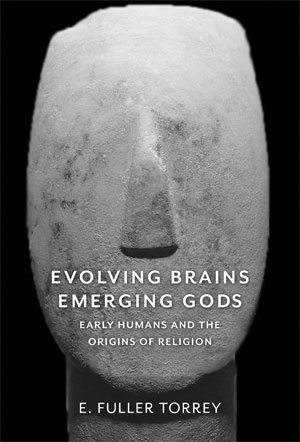
Based on an idea originally proposed by Charles Darwin, Evolving Brains, Emerging Gods argues that the emergence of gods was an incidental consequence of several evolutionary factors. Using data ranging from ancient skulls and archeological artifacts to child development, primate studies and brain imaging, the book traces how our evolving brain gave rise to new cognitive abilities that in turn produced new behaviors. Ultimately these new cognitive abilities led to the emergence of gods.
For example, approximately 1.8 million years ago a new hominin, Homo erectus, emerged. This hominin made better stone tools than its predecessors, made spears for hunting animals, controlled fire, and migrated halfway around the world. It is likely that Homo erectus had developed self-awareness. This cognitive ability may be a product of a special neuron that is found predominantly in human brain areas known to be associated with self-awareness. Intriguingly, this special neuron has also been found in smaller numbers in the brains of bonobos, chimpanzees, gorillas, orangutans, elephants and dolphins, all of which have demonstrated rudimentary self-awareness using mirrors. It has not been found in animals that have shown no self-awareness.
Similarly, approximately 40,000 years ago modern Homo sapiens began exhibiting an extraordinary range of new behaviors in painted caves, burials with grave goods, musical instruments, improved tools and weapons, memory devices – an outpouring of human creativity without precedent. It is likely that Homo sapiens had developed an autobiographical memory, the ability to relive past events emotionally, and use that information to plan the future. Humans had essentially conquered time, giving them a tremendous advantage over all other hominins. Soon Homo sapiens would stand alone as the last surviving hominin.
However, autobiographical memory was a two-edged sword. Once Homo sapiens could project himself into the future he became aware for the first time that he would die. Overwhelmed by this knowledge, he created an afterlife and peopled it with his ancestors. This ultimately led to ancestor worship. As people came together in towns and cities during the subsequent agricultural revolution, the ancestors were arranged in a hierarchy with the most powerful ultimately becoming the first gods.
The book is based upon four scientific principles. The first is the principle of human evolution. It was Darwin, in fact, who first suggested that a belief in gods might be a result of “structure of brain heredity.” The book uses modern neuroscience to fully develop Darwin’s original idea.
The second principle is parallel evolution. This occurs when organisms that have had a common genetic origin continue to evolve along similar lines even though they have been separated from each other for thousands, or even millions, of years. The most famous example of parallel evolution are the mammals of Australia, many of which are remarkably similar to mammals on other continents despite the fact that Australia drifted away from other continents more than 100 million years ago. Parallel evolution explains not only why agriculture developed at about the same time independently at several places in the world, but also why gods emerged at about the same time independently at several places in the world.
The third principle is the science governing the evolution and function of specific brain areas. For a century we have known which parts of the human brain evolved early and which parts evolved more recently. In recent years we also developed the technology to ascertain the function of specific brain areas. Thus we can now say with certainty that the motor cortex evolved very early, allowing a newborn child to hold on and suck, and the lateral prefrontal cortex evolved very recently, allowing humans to plan the future.
The final principle on which the book is based is that the cognitive development of children roughly parallels the evolution of our species. Thus children develop an awareness of self at about age two, and only later develop an awareness of what others are thinking, an understanding of death, etc. We can therefore use our knowledge of child development to make some informed guesses regarding the order of development of cognitive processes in human evolution.
My education and professional training led me to this book. As a university student I majored in religion. I then got a master’s degree in anthropology and worked for two years in Africa, thus experiencing other cultures. My training in medicine and psychiatry led me to focus on the brain, and I organized one of the most widely used brain collections for research. Evolving Brains, Emerging Gods is the composite result of those experiences.
For readers just browsing, I would hope that they would open to chapter six in the book and specifically to the section on skull cults. This is the time in history, about 10,000 to 8,500 years ago, when ancestor worship had apparently reached its peak and the first gods were about to emerge. It was the time of the birth of the gods.
The gradual shift from hunting and gathering to farming that had taken place between 12,000 and 7,000 years ago had brought about profound changes in the relationship between the living and the dead. A migratory lifestyle demands that the dead be buried wherever they die. A sedentary lifestyle, by contrast, allow for the burial of the deceased in the vicinity of the living and thus the accumulation of ancestors’ bodies over several generations. In southwest Asia it was common to bury the deceased directly beneath the family’s house and to exhume the body months later and remove the skull. The skulls were often lined up on the floor of the house along the wall. Over time it became common practice to paint some skulls. Other skulls were molded with lime, gypsum or mud plaster to resemble a human face, using seashells for eyes. There are suggestions that some plastered skulls were also adorned with hair.
At least 90 plastered skulls have been excavated to date from widely scattered sites. The best of them are works of art as well as cult objects and the effect on the viewer is stunning. Archeologists describe the uncovering of plastered skulls as “a highly emotive experience…there are, literally, faces from the past.” I viewed two plastered skulls in the archeological museum in Ankara and was deeply moved. Such skulls most likely belonged to high-ranking ancestors, some of whom would soon break through the celestial celling and become the first gods.
This book will not tell you whether God, or other gods, really exist – no book can do so. What I hope this book can do, however, is help readers think carefully about their theological beliefs. Gods are important and should not simply be dismissed by ridicule. Many people are troubled by their unresolved theological beliefs; insofar as this book helps them to achieve some resolution of belief, it will achieve its most important purpose.
I also hope the book will shed some light on the ongoing god contests which I find troubling. Wars continue to be fought to determine whose god is the correct god. Such wars were fought between city-states in ancient Mesopotamia, and apparently contributed to the demise of the world’s first civilization. An Old Testament god contest familiar to many is the battle between the followers of Baal, the Canaanite fertility god, and the followers of Jehovah, the Israelite protector of God. Elijah, a prophet of Jehovah, prevailed and then had the 450 followers of Baal but to death.
Finally, the book offers answers to many questions that have perplexed some people. For example, why don’t chimps speak? Why are they so similar to Homo sapiens in DNA yet so different cognitively? Why is it very unlikely that the Neanderthals had gods? And why were they wiped out so quickly when modern Homo sapiens encountered them? What is the meaning of the animals that adorn the painted caves? If Homo sapiens had acquired modern cognition attributes by about 35,000 years ago, why did it take more than 20,000 years more for the agricultural revolution to begin? The first gods only had responsibility for issues of food supply (life) and death; why did they later acquire political responsibilities? Just as the first gods appeared independently at several places in the world, why were most of the world’s major religions formalized in the brief period between 2800 and 2200 years ago?


E. Fuller Torrey, MD is the Associate Director for Research at the Stanley Medical Research Institute in Kensington, MD. He is the author of 20 books, including The Roots of Treason that was nominated by the National Book Critics Circle as one of the five best biographies of 1983.